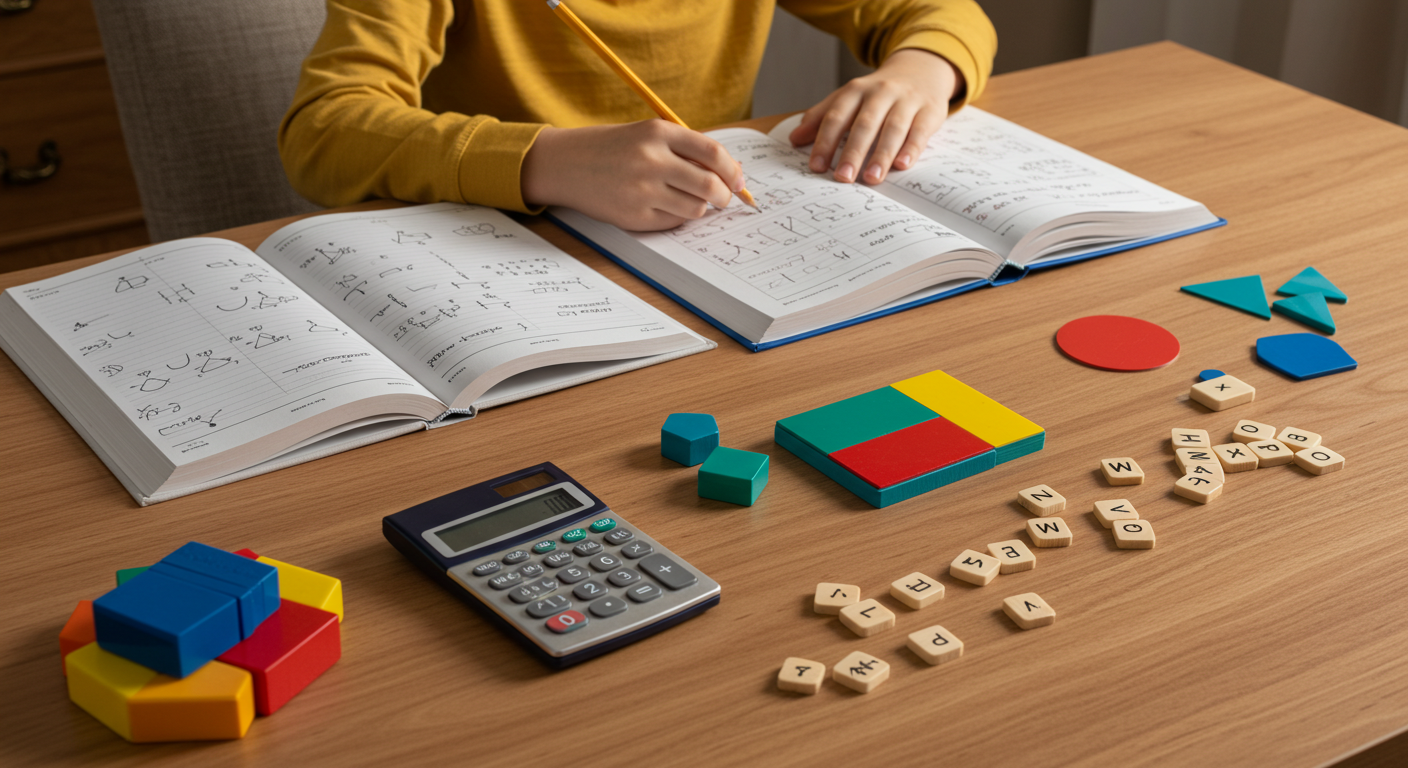
What Should Be in an 11 Plus Study Plan?
Preparing for the 11 Plus exam isn’t just about working hard—it’s about working intelligently. For parents supporting their child through this demanding process, it can feel like there’s a mountain of resources, tutors, timetables, and tests to choose from. The key is not doing everything, but doing the right things—consistently, calmly, and with purpose.
If you’ve been wondering what should be in an 11 Plus study plan, the answer lies in balance and structure. A well-thought-out plan helps your child build skills steadily, avoid burnout, and walk into the exam room with real confidence. Whether you’re working with a tutor, teaching at home, or using self-guided materials, the focus should be on depth, routine, and flexibility—tailored to your child’s learning rhythm.
1. A Clear Starting Point: Assessment and Realistic Goal Setting

Before diving into weekly schedules and past papers, pause. A good study plan begins by asking: Where is my child right now?
This means conducting a baseline assessment—either through informal observation, a practice test, or a diagnostic session with a tutor. You’re not just looking for scores; you want insight into:
- Strengths (e.g. fast mental maths, strong vocabulary, good spelling)
- Weaknesses (e.g. timing under pressure, inference, working memory)
- Confidence levels and test stamina
Once you understand your child’s profile, you can set realistic goals—not just “get into X school,” but incremental aims like:
- “Improve reading comprehension accuracy by 20% in 6 weeks”
- “Finish all verbal reasoning sections with time to spare by Easter”
- “Be confident with non-verbal patterns by summer”
This clarity sets the tone for everything that follows.
2. A Structured Weekly Routine (With Room to Breathe)
An effective study plan isn’t about stuffing every evening with 11 Plus prep—it’s about creating a rhythm your child can stick to. Consistency beats cramming.
A typical 11 Plus study week might include:
- 2–3 core content sessions: Covering maths, English, or reasoning topics
- 1 timed practice session: Short bursts of exam-style questions under pressure
- 1 review/reflection session: Going over errors, corrections, and misunderstood concepts
- Daily light reading: Encouraging fiction and non-fiction to boost comprehension and vocabulary
- 1 rest or creative day: Space to breathe, recharge, and avoid mental fatigue
The plan should be written down and visible, whether on a fridge chart, a digital planner, or a calendar. This turns vague intentions into habits. Most importantly, it allows both child and parent to feel in control of the process.
3. Coverage of All Four Core Subjects

Every strong study plan includes all components likely to appear in the 11 Plus—regardless of the format your child will eventually sit.
- English: Focus on comprehension, grammar, punctuation, and vocabulary. Don’t just do worksheets—engage in discussions about books, write short reviews, play synonym games, or explore poetic devices through fun texts.
- Mathematics: Beyond arithmetic, include word problems, logic-based puzzles, and multi-step reasoning. Encourage mental maths challenges at breakfast, or 5-minute drills before dinner—small moments add up.
- Verbal Reasoning: Build logic through decoding, letter sequences, word analogies, and cloze passages. Use flashcards or mobile apps if helpful, but keep it interactive and playful when possible.
- Non-Verbal Reasoning: Train spatial awareness and visual logic using pattern puzzles, rotations, and matrix-style questions. Give your child strategies for elimination and pattern spotting rather than just answers.
Even if your target school doesn’t include every section, these skills reinforce each other. For instance, verbal reasoning boosts vocabulary, while non-verbal reasoning sharpens visual memory—both of which are helpful in English and maths.
4. Timed Practice—But Introduced Gently
One mistake many parents make is diving into full mock papers too soon. The result? Low scores, panicked children, and rising stress.
Instead, integrate timed conditions slowly:
- Begin with untimed questions to build understanding
- Move to short timed bursts (e.g. “complete 10 questions in 7 minutes”)
- Then graduate to full timed sections and eventually entire papers
The goal is not just speed, but fluency under pressure. A confident child who understands the format and feels in control of timing will outperform one who’s simply been drilled.
Track results, but not obsessively. Progress in timing, accuracy, and calmness is more important than raw percentages early on.
5. A Feedback and Correction System That Builds Learning

Doing questions is one thing—learning from mistakes is another. A strong study plan should dedicate time each week to reviewing work, identifying patterns in errors, and discussing the “why” behind a mistake.
Ask:
- Was the mistake due to misreading the question?
- Did your child know the concept but rush?
- Was it a vocabulary gap or a misunderstanding of instructions?
Use mistakes as springboards for mini-lessons, memory tricks, or recap sessions. The more your child understands their thinking process, the more independent and adaptable they become.
6. Evolving the Study Plan Through the Academic Year
One of the most overlooked aspects of 11 Plus preparation is timing—not in the exam itself, but in how the study plan should evolve across the year. A rigid, unchanging plan is rarely effective. Instead, a high-quality study plan adapts to your child’s pace, retention, and emotional bandwidth as the exam date approaches.
In the early months (typically autumn of Year 5), the focus should be on building up foundational understanding—reading comprehension, arithmetic accuracy, vocabulary exposure, and familiarity with reasoning types. Sessions can be shorter and more exploratory, with room to discover strengths and uncover gaps.
As your child progresses into spring and summer, the study plan should gradually shift toward timed components, section-specific mastery, and exam familiarity. By this stage, your child should already be working with content that mimics the actual exam format—whether it’s GL, CEM, or ISEB.
In the final three months, refinement becomes the priority. The study plan should then incorporate full-length mocks, performance tracking, and targeted sessions on persistent weak areas. But just as importantly, this phase should also include active efforts to reduce anxiety and sharpen focus. Overworking at this point often has diminishing returns.
A smart study plan is not fixed in stone—it anticipates changes, absorbs feedback, and moves with purpose.
7. Using Mock Exams Intelligently

Mock exams are useful—but only when applied with strategic intent. Too many families rush into full mock testing without first ensuring that the core skills have been secured. The result? Low scores, panic, and confusion.
A well-designed study plan introduces mock exams after the child is familiar with the question types and expectations. These mocks should initially be sectional—just English comprehension, for example, or one verbal reasoning paper. Only later should you progress to full-length, timed mock exams that simulate the real environment.
Mock exams should serve three purposes:
- Test timing and stamina
- Reveal blind spots and recurring errors
- Build comfort with the exam format
They should never be treated as a measure of self-worth or final readiness. The goal is not perfection, but insight. Each mock should be followed by a careful review session that allows your child to analyse their performance, revisit mistakes, and improve technique. Without structured feedback, mocks become little more than a performance exercise.
Limit full mocks to once every two or three weeks in the final months. Any more, and you risk reducing your study plan to a cycle of stress and reactive correction. The priority remains growth, not repetition.
8. Factoring in Non-Academic Preparation
One of the hidden strengths of a successful 11 Plus candidate is not just what they know, but how they carry themselves—particularly in interviews or creative assessments.
Many top grammar and independent schools incorporate interviews, written tasks, or situational questions that assess a child’s ability to communicate ideas clearly, think independently, and demonstrate emotional intelligence.
Your study plan should gradually make space for these elements. That includes:
- Regular writing practice: both creative and discursive. Strong candidates know how to structure an idea, write with clarity, and express perspective.
- Oral reasoning practice: Ask your child open-ended questions. Invite them to explain their thinking. Discuss current events or themes from books they’re reading.
- Mock interviews: These can begin informally. Allow your child to experience being asked about their hobbies, how they handle challenges, or why they’re interested in a particular school. Over time, this builds fluency and confidence in conversation.
These non-academic elements should not be an afterthought. In many cases, they become the deciding factor in a child’s overall impression on a school. Integrating them into your study plan is a mark of a well-rounded, strategic approach.
9. Recognising When the Plan Needs Rebalancing

No study plan, however carefully constructed, remains perfect from start to finish. At some point, your child may stall. They may show signs of frustration, loss of motivation, or repeated dips in performance. These aren’t failures—they’re feedback.
A quality study plan must include space for course correction. If your child is:
-
Dreading study sessions
-
Plateauing in certain subjects
-
Rushing through tasks to ‘get it over with’
-
Showing signs of emotional fatigue or stress
—then the plan needs rebalancing.
Often the solution is not to work harder, but to change approach. That might mean:
- Shorter, more focused sessions
- Introducing new formats (games, discussions, audio-based comprehension)
- A temporary reduction in workload to allow recovery
- Or a sharper focus on one specific area to build confidence before resuming the broader plan
Ultimately, the plan must work for the child, not the other way around.
10. The Role of the Parent in the Study Plan
Parental involvement should not mean micromanagement, nor should it be entirely hands-off. A successful 11 Plus study plan benefits from a parent who is:
- Supportive, not pushy
- Structured, but flexible
- Informed, without obsessing
Your job is to facilitate the environment: set routines, offer encouragement, manage resources, and provide gentle accountability. But it’s equally important to recognise when to step back and let your child own the process.
The most effective study plans are not run like military drills—they are shaped around dialogue, trust, and adaptability. When your child feels heard, supported, and respected, their motivation becomes intrinsic, not forced.
Final Thoughts: A Plan That Builds More Than Just Scores

A well-executed 11 Plus study plan delivers more than just exam readiness. It builds independence, emotional maturity, and intellectual stamina—skills that matter far beyond entrance assessments.
If your child emerges from this process with sharper reasoning, greater resilience, and a deeper love of learning, then the plan has done more than prepare them for a test—it has prepared them for life.
Ultimately, success in the 11 Plus is not defined by how much material you cover, but by how well your child grows from it. The right study plan is not about overloading—it’s about aligning time, effort, and direction with the specific needs of your child.
And that’s the kind of preparation that creates true confidence, in the exam hall and beyond.
FAQs
1. How many hours per week should my child study for the 11 Plus?
Most children benefit from 4 to 6 hours a week in Year 5, increasing to around 7 to 9 hours closer to the exam. The key is short, focused sessions rather than long, draining study blocks.
2. When is the best time to start an 11 Plus study plan?
Light preparation can begin in Year 4, especially through reading and core maths. A formal, consistent plan should ideally start by the first term of Year 5.
3. Should I create a fixed timetable or a flexible routine?
A weekly routine helps with structure and momentum, but flexibility is essential to prevent burnout. Adapt based on your child’s energy levels and progress.
4. How often should mock exams be included?
Mock exams are most useful when introduced after core content is understood—usually every 3 to 4 weeks. Closer to the exam, once every 2 weeks is ideal if followed by proper review.
5. What if my child resists the study plan?
Resistance often signals that the workload, pace, or approach isn’t working. Adjust the format, include more breaks, or change the style of practice to re-engage them.
6. How do I balance school homework and 11 Plus prep?
Treat schoolwork as the priority and use evenings or weekends for 11 Plus tasks. If your child is overloaded, reduce prep to maintain energy and motivation.
7. Should reading be part of the study plan?
Absolutely—daily reading builds vocabulary, comprehension, and general knowledge. It supports every section of the 11 Plus, especially verbal reasoning and English.
8. Is a tutor necessary for the study plan to be effective?
Not always. Many children succeed with parent-led or self-guided plans if the structure is solid and resources are used wisely.
9. How do I measure progress without over-focusing on scores?
Look at improvement in timing, confidence, and accuracy across tasks. Progress is often reflected in better reasoning and fewer repeated mistakes.
10. What should I do in the final week before the exam?
Use the last week to review lightly, not cram. Prioritise calm, sleep, and confidence-building activities to help your child enter the exam feeling prepared and settled.



